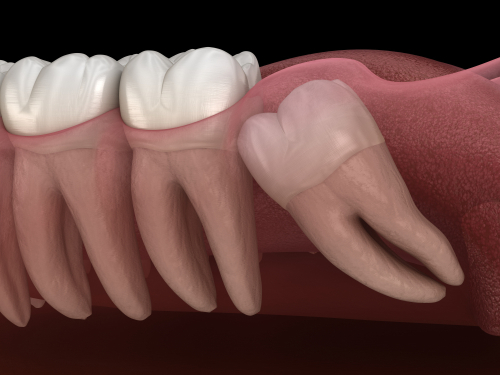Understanding Wisdom Teeth
 Your wisdom teeth, sometimes called “third molars,” consist of four back molars, the last set of teeth to emerge. They usually appear during adolescence or young adulthood, when we’re supposed to be absorbing plenty of life’s wisdom. These extra teeth are a leftover relic of humanity’s cave-dwelling days when we needed them to chew and grind our rougher diet, which consisted of far more hard nuts, raw meat, and uncooked vegetables. However, as our diets, cooking techniques, and table manners became more refined, the need for those extra molars declined. Over many centuries, humans evolved to have smaller jaws, leaving less room for these late-blooming teeth. When they can’t grow properly, your wisdom teeth can cause problems with your other teeth and oral health. Nowadays, nearly 85% of people will need their wisdom teeth removed at some point.
Your wisdom teeth, sometimes called “third molars,” consist of four back molars, the last set of teeth to emerge. They usually appear during adolescence or young adulthood, when we’re supposed to be absorbing plenty of life’s wisdom. These extra teeth are a leftover relic of humanity’s cave-dwelling days when we needed them to chew and grind our rougher diet, which consisted of far more hard nuts, raw meat, and uncooked vegetables. However, as our diets, cooking techniques, and table manners became more refined, the need for those extra molars declined. Over many centuries, humans evolved to have smaller jaws, leaving less room for these late-blooming teeth. When they can’t grow properly, your wisdom teeth can cause problems with your other teeth and oral health. Nowadays, nearly 85% of people will need their wisdom teeth removed at some point.
Since wisdom teeth removal is so common in Springfield, many local families remove wisdom teeth before they emerge. However, you should only make this decision after consulting with a dentist like Dr. Zirakian, who can use advanced 3D X-ray technology to predict future wisdom tooth problems.
The Problem With Wisdom Teeth
Wisdom teeth can cause several oral health issues as they come in. These problems can include:
- Overcrowded mouth: When you include wisdom teeth, adults have 32 teeth to fit in their mouth. With limited space, thanks to how our jawbone is constructed, it can be difficult for wisdom teeth to have enough space to grow properly. When there’s not enough room, they can become misaligned, crowding and damaging adjacent teeth and putting stress on the jawbone and surrounding nerves.
- Difficult cleaning process: Because your wisdom teeth are so far back in the mouth, they’re more difficult to clean. This can lead to infections and decay, which would require additional dental procedures like periodontal treatment.
- The impact of impaction: Because of the lack of space, wisdom teeth can often grow at odd angles, even horizontally. When they become trapped under the gumlines or in the jawbone, this is known as impaction. Impacted wisdom teeth can cause pain, swelling, difficulty opening your mouth, and even bad breath.
The Tooth Extraction Process
There are two types of tooth extraction procedures. The appropriate one depends on the tooth’s accessibility.
Simple Extraction
We only use this procedure if the tooth is easily accessible. After numbing the area with a local anesthetic, Dr. Zirakian will use special dental tools to loosen and remove the targeted tooth. If you’ve ever wondered what “pulling a tooth” meant, this is it. Since wisdom teeth are so far back in your mouth, this type of extraction is not always possible.
Surgical Extraction
This extraction is for teeth that are not easily accessible. A surgical extraction begins with applying a local anesthetic so you won’t feel any discomfort. This time, we will make an incision in the gums and may need to break up the tooth for removal. We will then seal the incision with stitches and provide you with aftercare instructions to navigate the next few days of recovery. If your tooth is severely or partially impacted, we may refer you to an outside specialist.
Schedule Your Wisdom Teeth Extraction in Springfield Today
It’s better to understand potential problems with wisdom teeth rather than wait until you’re experiencing them to take action. If you want to learn more about wisdom tooth removal in Springfield, contact our office to schedule a free consultation. Dr. Zirakian and the caring, experienced staff at East Longmeadow Family Dental Center can make wisdom tooth removal a simple and painless process.
